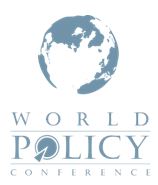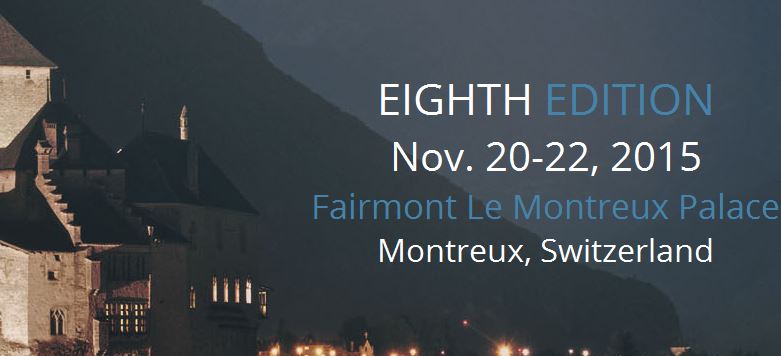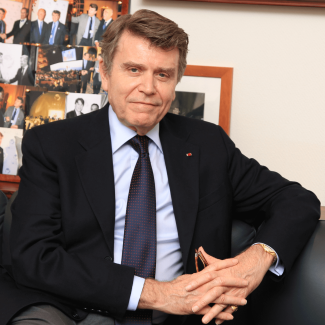Opening speech of the 8th edition of the World Policy Conference, Montreux, Switzerland

The eighth World Policy Conference, or WPC as we call it, opens exactly one week after the so-called “Islamic State” committed the terrorist attacks in Paris. The civilised world, in all its forms that have come down through history, with all its diversity and richness, weeps over and is outraged by this barbarism. Indignation can bring out the best in human aspirations, but it is not enough. Neither terrorism nor any of the contemporary world’s other ills will be defeated by expressing emotions alone. Only a genuinely international policy in the highest sense of the term will allow the world to make it through the 21st century without repeating tragedies on the scale of those that wracked the 20th.

These thoughts led us to launch the WPC on the other side of the lake, in Evian, in 2008. Our goal is to help to improve governance, in all its aspects, in order to foster the emergence of a world that is more open, more prosperous, more just and respectful of the diversity of States and nations. Respect is essential. Any ideology bent on conquest, even in the name of human rights, is harmful to peace. Every people has its own history. Every people has its culture and traditions. Every people develops at its own pace and devises its own solutions. That is why we seek to gather senior figures from the five continents, always a limited number — political and economic leaders, representatives of civil society, researchers and journalists — in a climate of trust and a spirit of tolerance to think about, debate and put forward constructive solutions to major regional and international challenges. We give the floor to representatives of medium-sized powers, whose views are too often not heard enough in the debates, even though we need to know more about them in order to avoid making the same kinds of historic mistakes that have occurred in the recent past. Last year we met in Seoul, where Park Geun-hye, the President of South Korea, gave a landmark speech. This year takes us to Montreux. I would like to thank Didier Burkhalter, the Federal Councillor, the President of the Swiss Confederation in 2014 and the head of the Federal Department of Foreign Affairs, for agreeing to deliver the opening address. Switzerland’s position, stemming from an extraordinary history in the heart of Europe, allows it to play a unique role in the contemporary world. I think it is a prime example of the richness of the idea of a medium-sized power that we hold so dear. In a very broad sense, Switzerland has the ability to exert a positive, stabilising influence on the global or at least the regional environment. I believe in particular that today, as in the past, neutrality can still be a major asset. In this regard, the experience of the Swiss Confederation is a common good of humankind.
The first WPC took place in Evian at the beginning of October 2008, just a few days after Lehman Brothers collapsed, a context illustrating the need to strengthen global governance. It was also a time when the Georgian crisis stoked serious tensions in Europe. Dmitry Medvedev, then President of the Russian Federation, used our conference as a sounding board to develop a proposal to update the Helsinki Charter. In my opinion, this idea is more relevant than ever. Many economic and political crises have rocked the world since 2008. Organising its governance always lags behind growing, poorly controlled interdependencies. That is why our WPC project will never be too ambitious.
As the eighth WPC opens, we are still reeling from the Paris attacks. The peaceful coexistence of religions is now a major geopolitical issue. We will talk about this with President Thomas Boni Yayi. But the fact is that the cynical, hateful and monstrous political manipulation of Islam by satanic leaders who indoctrinate alienated young people to turn them into suicide bombers has become a global threat. This scourge has just plunged France into mourning, but it can strike anywhere, any time. However, nobody can deny that its main victim is the Muslim world, which it is slowly undermining. This is not the place to examine policing, judicial or intelligence measures or, more generally, the adjustments many countries have to make to deal with this form of warfare, which experts rightly call asymmetrical and low-intensity. On the other hand, here we must address the diplomatic conditions necessary to reverse the trend, uninterrupted since the end of the Cold War, towards increasing chaos in the Middle East. No State in the region can hope to remain unscathed if this continues. I hope the nuclear agreement with Iran has made a reversal possible. It must still be made probable. Many efforts, shared between the main powers concerned both inside and outside the region, are necessary to achieve that goal.
Rebuilding a viable order in the Middle East will take a long time. The endeavour will not succeed without settling the Israeli-Palestinian conflict, now over 70 years old. Meanwhile, the influx of refugees pouring into the European Union is putting it to a severe test. The conjunction of the euro zone crisis, which can flare up again, the prospect of Brexit, the refugee crisis and the rise of populism pose potentially existential threats to the Union. But ensuring its survival, and even strengthening it, are essential for bolstering global governance as a whole. We will obviously discuss the refugee crisis, which to a great extent demonstrates the need for a new order in the Middle East, but also the development of Africa, on which I would like the WPC to focus increasing attention. I would also like to stress that education is of primary importance for solving all these problems.
The Middle East in the broadest sense is certainly the main geopolitical concern right now, but there are others. I am thinking of Russia and Ukraine, of course, but also of the tensions in East Asia, which we talked about a lot in Seoul, and that will also be discussed in Montreux. It seems to me that some encouraging signs can be made out on both fronts. But as the French proverb says, one, and I would even say two, swallow does not mean spring is here.
Growing interdependence means that international politics and the global economy increasingly overlap. The usual issues of economic and monetary cooperation are still very important, all the more so since, despite the progress that has been made, the potential for instability from the 2007-2008 crisis lingers on. But it seems to me that we at the WPC must also focus on issues of “geo-economics”, in other words issues where States use economic means to achieve geopolitical ends. I am thinking about sanctions, energy policy — especially oil and gas pipelines —and, typically, the rising number of bilateral or multiregional trade agreements at the expense of the multilateral paradigm of the WTO. That is the context in which the TPP, which has just been concluded, or the TTIP, which has yet to be, should be debated. I am also thinking about China’s vision of the Silk Road and about the creation of the AIIB, which is sending ripples through the Western-dominated order that emerged after the Second World War.
The purpose of these introductory remarks is not to lay out the detailed agenda of the next three days. We will take up many other crucial issues, such as energy, food, water, health and digital technology. All of them have an impact on global governance and, consequently, on the gradual building of a genuine desire to live together on the planetary scale. But I would like to conclude by stressing the need to always keep ethics in mind when dealing with issues involving the gradual construction of a global governance capable, as I said at the beginning, of keeping the world reasonably open and tolerant. In the short term, that project requires stakeholders to act realistically and pragmatically. It can never be said enough how much ideology is a bad advisor in this area. On the other hand, the conditions for any organisation’s long-term viability are fundamentally ethical. Ideology divides, whereas ethics must bring us closer together. Decision-makers, who must always navigate between more or less compatible and competing demands, take the medium term as their timeframe. That is why we would like the WPC to increasingly take ethical considerations into account, starting this year with the way we take up digital technology and climate change, since we are meeting on the eve of COP21.
Speaking of COP21, there is still one aspect of global governance that should be stressed: the unprecedented political and technical complexity of negotiations that address truly global issues. Despite a thousand years of experience between them, diplomats are still feeling their way, and the climate talks are also vitally important from that point of view.
“There is nothing new under the sun,” it says in Ecclesiastes. Nothing, and certainly not the coexistence of civilisation and barbarism. Nothing, if not an unprecedented acceleration of history, in the heart of which the greatest technological revolution the world has ever seen is continuing to unfold, bringing us, full of trepidation but also hope, into uncharted waters.
Thank you.






